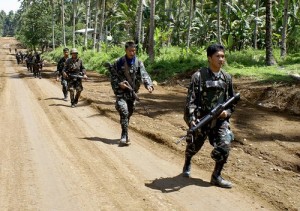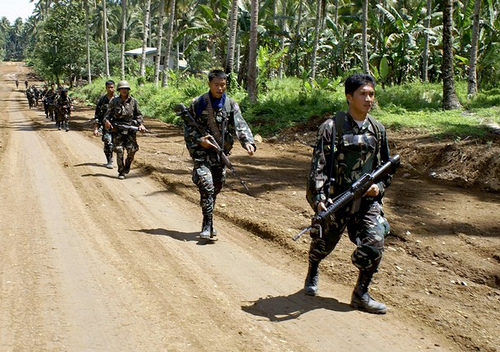
AFP PHOTO
After 36 years of conflict with the militant Moro Islamic Liberation Front (MILF), the Philippine government seems to be close to striking a peace deal, as talks between the rebels and the government have led to concessions overcoming some of the biggest obstacles to peace.
The deal would impose a ceasefire in predominantly Muslim areas of the island of Mindanao, an impoverished yet resource-rich region in the south of the Philippines.
According to Reuters, negotiators from both sides have acknowledged the progress made, which many hope will bring an end to a 12 year long ‘all out’ campaign initiated by the government that has displaced at least 700,000 people on Mindanao, according to the Internal Displacement Monitoring Centre.
The deal also allows for a new autonomous region to be created before the end of President Benigno Aquino’s term in 2016. The chief government negotiator Marvic Leonen said the deal will be completed this year, according to Reuters, perhaps as early as October during the next round of peace talks held in Malaysia.
The current conflict began in 1968, when as many as 68 Muslim military trainees were slaughtered by the army. The details of the event are unclear, but one theory suggests then-president Ferdinand Marcos was trying to stir dissent in the Malaysia-contested Sabah region and the Muslim soldiers were slaughtered for refusing to carry out orders.
The massacre led to the creation of militant groups, one of which was MILF. In 2000, President Joseph Estrada suspended an uneasy truce with MILF and declared an all out war against the rebels, increasing militant activities and government operations which have killed over 100,000 people.
While the deal could effectively bring an end to the decades long conflict with MILF, other militant groups still remain and could pose a potential threat to the peace.
“We are close to it, but there are still big elephants in the room, such as territory, internal security, and wealth-sharing arrangements,” the chief negotiator with MILF rebels, Mohagher Iqbal, told Reuters.
The deal with MILF would open up Mindanao to development and investments. Aquinao pledged to provide the impoverished state the largest share of government allocated infrastructure funds. According to Reuters, the deal for MILF could also be motivated by the possible development of the island’s mineral industries.



